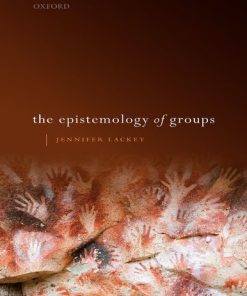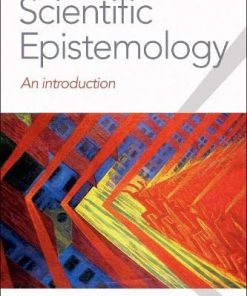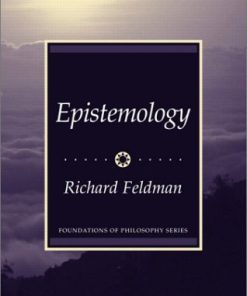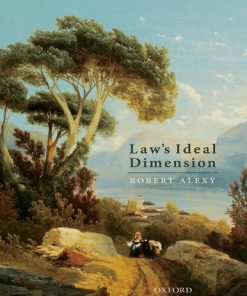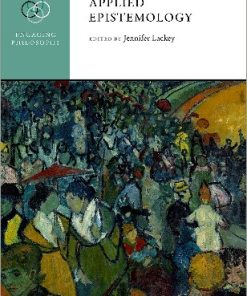(Ebook PDF) Non Ideal Epistemology 1st edition by Robin Mckenna 0192888846 9780192888846 full chapters
$50.00 Original price was: $50.00.$25.00Current price is: $25.00.
Non-Ideal Epistemology 1st edition by Robin Mckenna – Ebook PDF Instant Download/DeliveryISBN: 0192888846, 9780192888846
Full download Non-Ideal Epistemology 1st edition after payment

Product details:
ISBN-10 : 0192888846
ISBN-13 : 9780192888846
Author: Robin Mckenna
Epistemologists often work with idealized pictures of what inquirers are like, how they interact with each other, and the social institutions and environment in which they do the interacting. These idealizations might be appropriate for the more foundational issues in epistemology, such as the theory of knowledge. However they become problematic when epistemologists address applied and practical topics, such as public ignorance about important political and scientific issues, or our obligations and responsibilities as inquirers. A solution to a problem like public ignorance that might work in an ideal world could be disastrous in the real world. Ways of interacting that would yield epistemic benefits in an epistemically just world might not be so beneficial in an epistemically unjust world. Author Robin McKenna argues that, to avoid these problems, we need to make space for non-ideal epistemology-a way of doing epistemology that eschews the idealizations typical in much contemporary epistemology. However Non-Ideal Epistemology is not just an exercise in philosophical methodology. McKenna also develops distinctive approaches to a range of important topics in applied and social epistemology, such as what to do about science denial, whether we should try to be intellectually autonomous, and what our obligations are to other inquirers. The result is an illustration of why we need non-ideal epistemology and what it can do for us.
Non-Ideal Epistemology 1st Table of contents:
1. What Is Non-Ideal Epistemology?
1.1 Three Aims
1.2 Three Faces of Non-Ideal Epistemology
1.3 Non-Ideal Epistemology and Feminist Epistemology
1.4 Overview
2. Ideal and Non-Ideal Theory
2.1 Ideal Theory in Ethics and Politics
2.2 Full vs. Partial Compliance Theory
2.3 Utopian vs. Realistic Theory
2.4 Mills and Ideal Epistemology
2.5 Objections
3. Anderson and Goldman on Identifying Experts
3.1 Goldman on Identifying Experts
3.2 Goldman and Ideal Theory
3.3 Anderson on Identifying Experts
3.4 Goldman vs. Anderson
3.5 Two Tasks for Anderson
4. Persuasion and Paternalism
4.1 Non-Ideal Institutional Epistemology
4.2 Gathering the Evidence
4.3 Epistemic Paternalism and Intellectual Autonomy
4.4 Riley on Nudging and Epistemic Injustice
4.5 Meehan on Nudging and Epistemic Vices
4.6 Tsai on Rational Persuasion and Paternalism
4.7 Intellectual Autonomy
5. Intellectual Autonomy
5.1 What Is Intellectual Autonomy?
5.2 Against Carter on Intellectual Autonomy
5.3 More on Motivated Reasoning
5.4 Against Roberts and Wood on Intellectual Autonomy
5.5 Intellectual Autonomy and Epistemic Paternalism
5.6 Becoming Intellectually Autonomous
6. The Obligation to Engage
6.1 Mill on the Obligation to Engage
6.2 Cassam on the Obligation to Engage
6.3 The Obligation to Engage in Inhospitable Environments
6.4 The Obligation to Engage and Epistemic Exclusion
6.5 Full vs. Partial Compliance Theory
6.6 Ballantyne, Fantl, and Srinivasan
6.7 Towards a Non-Ideal Theory
7. Liberatory Virtue and Vice Epistemology
7.1 Liberatory Virtue Epistemology
7.2 Medina on Intellectual Virtue and Vice
7.3 Making Sense of Responsibility
7.4 Medina on Epistemic Responsibility
7.5 Ideal Theory and Epistemic Responsibility
8. Scepticism Motivated
8.1 Even More on Motivated Reasoning
8.2 The Unreliability of Politically Motivated Reasoning
8.3 Politically Motivated Reasoning and Basing
8.4 Debunking Arguments
8.5 Scepticism in Non-Ideal Epistemology
People also search for Non-Ideal Epistemology 1st:
prejudice a study in non ideal epistemology
non-epistemic values examples
non epistemic values
non-ideal meaning
non-ideal theory
Tags:
Non Ideal,Epistemology,Robin Mckenna
You may also like…
Politics & Philosophy - Anthropology
Politics & Philosophy - Social Sciences
Scientific Epistemology: An Introduction Hilary 0197609589 9780197609583
Uncategorized
Politics & Philosophy - General & Miscellaneous Philosophy
Politics & Philosophy - Anthropology
Politics & Philosophy - Anthropology
Fiction
Jurisprudence & Law - Constitutional Law
Politics & Philosophy - Anthropology




